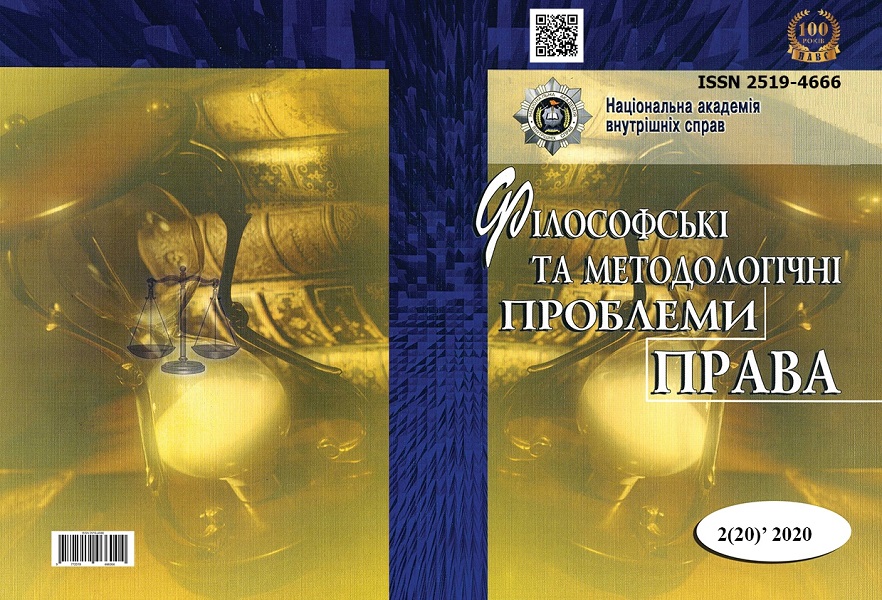Justice as a Part of the Idea of Law and its Place in the System of Legal Values
Abstract
The purpose of the article is to study the nature and essence of the concept of justice as an element of the idea of law, determining the trend of development of the category of justice in different periods of formation of legal thought and to the present. Emphasis is placed on the leading role of justice in the system of legal values. Methodology. The methodological basis of the work are philosophical and general scientific methods of scientific knowledge. The main methodological approach is axiological, because it allowed to reveal the meaning of justice as a legal value. A significant place is given to the phenomenological approach, which contributed to the consideration of justice both at the level of individual subjective experiences and at the level of law enforcement. Due to the historical approach, the peculiarities of the formation and development of the understanding of justice as an element of the idea of law are considered. The systems approach allowed us to explore justice as a holistic multifaceted phenomenon. Formal-logical and system-functional methods were used to analyze the conceptual foundations of justice in the context of legal relations. The scientific novelty of the obtained results is that the essence of justice as a product of cultural, historical, political, legal development of society and a catalyst for ensuring the rights and interests of the individual is defined. Today, it is quite common for the state to issue norms that violate the rights of individuals or are unfairly applied in the process of regulating public relations. Therefore, there is a need to study justice as the foundation of the entire system of moral and ethical values in the legal system and society as a whole. Conclusions. The analysis allows us to conclude that it is the order of coexistence of people on the basis of mutual recognition of rights and freedoms can be called fair or «justice». The law is based on the idea of justice and is a normatively enshrined justice. It is justice that is the basis of the idea of law, expresses its essence, and a special act of recognition determines both justice and the phenomenon of law in general. Justice is a special mechanism that maintains a balance of legal values, and at the same time is a determining factor in the dominance of their conflict.
Keywords: justice; the idea of law; legal values; public relations; constitutional state; rule of law.
Downloads
References
Бандура О. О. Антропологія права як складова філософської антропології (загальний нарис). Філософські та методологічні проблеми права. 2019. № 1 (17). С. 8–15. doi: https://doi.org/10.33270/01191702.8.
Бандура О. О. Справедливість та її роль у системі цінностей права. Закон и жизнь. 2012. № 11. С. 31–34.
Бандура О. О. Гносеологія права як складова філософської гносеології (загальні міркування). Філософські та методологічні проблеми права. 2019. № 2 (18). С. 52–62. doi: https://doi.org/10.33270/02191802.52.
Братасюк М. Г. Співвідношення загальних принципів та норм права в основних типах праворозуміння. Філософські та методологічні проблеми права. 2016. № 1 (11). С. 60–72. URL: http://nbuv.gov.ua/UJRN/Fmpp_2016_1_7.
Дзьобань О., Мануйлов Є. Справедливість як правова цінність: концептуалізація феномену. Вісник Національного університету «Юридична академія України імені Ярослава Мудрого». 2015. № 1. С. 102–113.
Конституція України : Закон України від 28 черв. 1996 р. № 2341-III. URL: https://zakon.rada.gov.ua/laws/show/2341-14.
Конвенція про захист прав людини і основоположних свобод : міжнар. док від 4 листоп. 1950 р. URL: http://zakon3.rada.gov.ua/laws/show/995_004.
Мартенко О. Л., Павлишин О. В. Взаємозв’язок мислення, свідомості та мови в концепціях античних мислителів. Юридична психологія. 2019. № 2 (25). С. 31–38. doi: https://doi.org/10.33270/03192502.31.
Паляниця О. Г. Універсалізм правових цінностей: поняття та різновиди. Науковий вісник Ужгородського національного університету. 2018. Вип. 55. Ч. 1. Т. 1. С. 14–17. (Серія «Право»).
Павлишин О. В. Правова реальність як знакова система : монографія. Харків : Право, 2017. 336 с.
Павлишин О. В., Кравчук О. В., Лев О. Р. Антропологічно-правові виміри професійної деформації моральної свідомості працівників Національної поліції України. Філософські та методологічні проблеми права. 2019. № 2 (18). С. 71–80. doi: https://doi.org/10.33270/02191802.71.
Тернавська В. М. Правові цінності в аспекті правової глобалізації: теоретико-правовий аналіз. Lublin, the Republic of Poland. October 30–31, 2020. doi: https://doi.org/10.30525/978-9934-588-92-1-29.
Цивільний кодекс України : Закон України від 16 січ. 2003 р. № 435-IV.Відомості Верховної Ради України. 2003. № 40–44.
Яковенко М. М. Ґенеза вчень про справедливість як соціальне явище. Право. 2019. № 3. С. 11–17. doi: 10.32782/LAW.2019.3.2.
Яковенко М. М. Справедливість як елемент права. 2019. URL: http://science.lpnu.ua/sites/default/files/journal-paper/2019/nov/19966/yakovenko.pdf.
Зелениця І. М. Теоретико-правові засади реалізації концепції справедливості в правовій системі. URL: https://sworld.com.ua/konfer29/1238.pdf.
Жебровська К. А. Правові цінності: багатоманітність прояву. Юридичний вісник. 2015. № 2. С. 10–14.
Abstract views: 2755 PDF Downloads: 2118
Copyright (c) 2021 Philosophical and Methodological Problems of Law

This work is licensed under a Creative Commons Attribution-NonCommercial-NoDerivatives 4.0 International License.
- Authors reserve the right to authorship of their own work and transfer to the magazine the right of the first publication of this work under the terms of the Creative Commons Attribution License, which allows other persons to freely distribute published work with mandatory reference to authors of the original work and the first publication of an article in this magazine.
- Authors have the right to enter into separate additional agreements on non-exclusive dissemination of the work in the form in which it was published in the journal (for example, to post an article in the institution's repository or to publish as part of a monograph), provided that the link to the first publication of the work in this journal is maintained.
- The journal's policy allows and encourages the posting of articles by authors on the Internet (for example, in electronic storehouses of institutions or on personal websites), both before the submission of this manuscript to the editorial office and during its editorial processing, as this contributes to the creation of a productive scientific discussion and positively affects the efficiency and dynamics of citing the published work.




